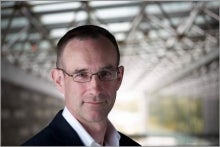Phys10 Undergraduate Seminar Series
 Dr.
Raymond
Laflamme
Dr.
Raymond
Laflamme

Faculty,
Canada
Research
Chair
University
of
Waterloo,
department
of
Physics
&
Astronomy
Institute
for
Quantum
Computing
On March 14 2018, the Universe has lost one of its admirers, a scientist, communicator and humanist that prodded and answered some of its deepest and most profound properties. Stephen Hawking passed away leaving behind a transformed view of the cosmos. He proved that time had a beginning if Einstein's general relativity is correct, that black ain't so black after all and he proposed that the Universe can be described by a quantum mechanical wave function with no edge or boundaries. From 1984 to 1988 I was one of Stephen's graduate students and worked on quantum cosmology and the arrow of time which earned me a quote in the book: "A Brief History of Time". After a post doctoral fellowship at UBC, I went back to Cambridge for 2 years as a Research Fellow in Stephen's group and met him at various conferences around the world and during his visit in Waterloo. A few years ago I contributed to a book that he wrote with his daughter Lucy "George and the Unbreakable Code". In this talk, I will describe some of Stephen's contribution to our understanding of the Universe and will include in my comments, stories and anecdotes of being one of his students.
We will be alternating each week between the 4:30 PM (RCH 101) slot and the 2:30 PM (STC 1012) slot. Even if it's not "your" section, you are more than welcome to attend (assuming no lab/class conflicts).
The Phys10 Undergraduate Seminar series welcomes everyone to attend.